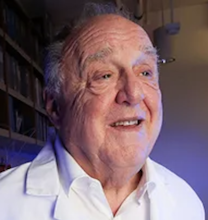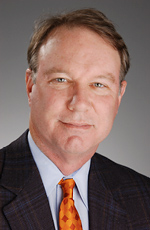Related Research Articles

Scripps Research,previously known as The Scripps Research Institute (TSRI),is a nonprofit American medical research facility that focuses on research and education in the biomedical sciences. Headquartered in San Diego,California,with a sister facility in Jupiter,Florida,the institute has over 200 laboratories employing 2,400 scientists,technicians,graduate students,and administrative and other staff,making it the largest private,non-profit biomedical research organization in the United States and among the largest in the world.

Kyriacos Costa Nicolaou is a Cypriot-American chemist known for his research in the area of natural products total synthesis. He is currently Harry C. and Olga K. Wiess Professor of Chemistry at Rice University,having previously held academic positions at The Scripps Research Institute/UC San Diego and the University of Pennsylvania.
Benjamin Franklin Cravatt III is a professor in the Department of Chemistry at The Scripps Research Institute in La Jolla,California. Considered a co-inventor of activity based proteomics and a substantial contributor to research on the endocannabinoid system,he is a prominent figure in the nascent field of chemical biology. Cravatt was elected to the National Academy of Sciences in 2014,and the American Academy of Arts and Sciences in 2016. He is Gilula Chair of Chemical Biology,a Cope Scholar,and a Searle Scholar.

Richard Alan Lerner was an American research chemist. Best known for his work on catalytic antibodies,Lerner served as President of The Scripps Research Institute (TSRI) until January 1,2012,and was a member of its Skaggs Institute for Chemical Biology,in La Jolla,California.

The University of Kentucky College of Pharmacy is a college of pharmacy located in Lexington,Kentucky. In 2016,U.S. News &World Report recognized the UK College of Pharmacy as one of the nation's top ten pharmacy programs.

The College of Arts and Sciences,the largest of the 16 colleges at Florida State University,contains the majors of nearly 11,000 students and is made up of 18 departments,nine interdisciplinary programs,and 14 centers,programs and institutes. Nearly 2,600 degrees are issued to graduates each academic year. There is currently a faculty-to-student ratio of 22:1 and 50 percent of the Arts and Sciences faculty and TAs who teach nearly half of all credit hours. The college encompasses the fields of social sciences,liberal arts,mathematics,sciences and interdisciplinary studies. National and international recognition have been given to faculty for their teaching,research,and hard work to the profession. In addition,Martin Luther King Jr. Distinguished Scholar Awards,University Teaching and Advising Awards,and Developing scholar Awards have been awarded to 125 faculty members at the Arts and Sciences college.
Samuel J. Danishefsky is an American chemist working as a professor at both Columbia University and the Memorial Sloan-Kettering Cancer Center in New York City.
Jeffery W. Kelly is an American chemist and entrepreneur who is on the faculty of the Scripps Research Institute in La Jolla,California.

Dr. William E. Evans,Pharm.D. served as St. Jude Children’s Research Hospital’s fifth director and CEO from 2004 to 2014. From 1986 to 2002,he chaired the St. Jude Department of Pharmaceutical Sciences,and from 2002 to 2004 served as the hospital’s scientific director and executive vice president. He also currently holds the St. Jude Professorship and Endowed chair at the University of Tennessee College of Medicine and Pharmacy.
Harvey Franklin Lodish is a molecular and cell biologist,professor at the Massachusetts Institute of Technology (MIT),Founding Member of the Whitehead Institute for Biomedical Research,and lead author of the textbook Molecular Cell Biology. Lodish's research focused on cell surface proteins and other important areas at the interface between molecular cell biology and medicine.
Ronald R. Breaker,Ph.D. is a Sterling Professor of Molecular,Cellular,and Developmental Biology at Yale University. He is best known for the discovery of riboswitches. His current research is focused on understanding advanced functions of nucleic acids,including the discovery and analysis of riboswitches and ribozymes.

Don W. Cleveland is an American cancer biologist and neurobiologist.
Nancy Rutledge Zahniser was an American pharmacologist,best known for her work involving the mechanism of dopaminergic pathways and chemical modifications of them. Although born in Ann Arbor,Michigan,Zahniser grew up in Chillicothe,Ohio and subsequently enrolled at the College of Wooster,where she obtained a degree in chemistry. After completing her degree,Zahniser spent some time in India where she met her first husband Mark Zahniser;she later returned to the United States to attend the University of Pittsburgh School of Pharmacy,where she earned her PhD in pharmacology in 1977. Zahniser went on to complete her post-doctoral training at the University of Colorado Health Sciences Center's Department of Pharmacology and then became a part of the faculty there. In 2007,she became associate dean for research education. She played a role in advancing the careers of many post-doctoral students in her lab. In addition to her work as a professor,Zahniser was also a member of several boards,committees,review panels,and professional societies related to pharmacology,neuroscience,and addiction. She led several national research meetings from 1995-2002.

Miguel A. García-Garibay is a professor of chemistry and biochemistry and the dean of physical sciences at University of California,Los Angeles (UCLA). His research focuses on solid state organic chemistry,photochemistry and spectroscopy,artificial molecular machines,and mesoscale phenomena.
Paul A. Wender is an American chemist whose work is focused on organic chemistry,organometallic chemistry,synthesis,catalysis,chemical biology,imaging,drug delivery,and molecular therapeutics. He is currently the Francis W. Bergstrom Professor of Chemistry at Stanford University and is an Elected Fellow at the American Association for the Advancement of Science and the American Academy of Arts and Sciences.
Mark H. Schoenfisch is an American analytical chemist. He is the Peter A. Ornstein Distinguished Professor of Chemistry at the University of North Carolina at Chapel Hill and is jointly appointed with the institution's Schools of Medicine and Pharmacy. His research interests include analytical sensors,biomaterials,and the development of macromolecular nitric oxide release scaffolds as novel therapeutics. Intellectual property originating from his research group is the basis of technology being commercialized by Novan,Diabetic Health,and Vast Therapeutics located in the Research Triangle Park.

Carlos F. Barbas III was chair professor of the Janet and Keith Kellogg II and a chemist at the Scripps Research Institute. Barbas developed new therapies that can target HIV-1 and some kinds of cancer which went into clinical trials.

Julie Ann Johnson is an American clinical pharmacist and translational scientist. She is the Dean and Distinguished Professor in the University of Florida College of Pharmacy and a Member of the National Academy of Medicine. For four consecutive years,she was a Clarivate Analytics Highly Cited Researcher in Pharmacology and Toxicology,indicating she was one of the "world's leading scholars in the sciences and social sciences in the preceding decade."
Donald E. Letendre is an American University professor and pharmacist. He is the Dean of the University of Iowa College of Pharmacy.
Jin-Quan Yu is a Chinese-born American chemist. He is the Frank and Bertha Hupp Professor of Chemistry at Scripps Research,where he also holds the Bristol Myers Squibb Endowed Chair in Chemistry. He is a 2016 recipient of the MacArthur Fellowship,and is a member of the American Academy of Arts and Sciences,American Association for the Advancement of Science,and the Royal Society of Chemistry. Yu is a leader in the development of C–H bond activation reactions in organic chemistry,and has reported many C–H activation reactions that could be applicable towards the synthesis of drug molecules and other biologically active compounds. He also co-founded Vividion Therapeutics in 2016 with fellow Scripps chemists Benjamin Cravatt and Phil Baran,and is a member of the scientific advisory board of Chemveda Life Sciences.
References
- 1 2 "LEARNING, LEGACIES, & HIS LABOR OF LOVE". September 8, 2016. Retrieved June 12, 2021.
- 1 2 "Spotlight: Kiplin Guy". CERN. May 2013. Retrieved June 12, 2021.
- ↑ "ALUMNI PROFILES: Kip Guy". Scripps Research . Retrieved June 12, 2021.
- 1 2 "R. KIP GUY, PHD, TO SPEAK AT OHIO STATE DURING 2018 DISTINGUISHED LECTURE SERIES". Ohio State University. May 21, 2018. Retrieved June 11, 2021.
- ↑ "R. Kip Guy, PhD". University of Kentucky. Retrieved June 14, 2021.
- ↑ "St. Jude experimental anti-malarial drug shows promise in first clinical trial". Eurekalert. April 8, 2020. Retrieved June 14, 2021.
- ↑ Perry, Allison (July 5, 2016). "UK College of Pharmacy Names New Dean". University of Kentucky. Retrieved June 14, 2021.
- ↑ Colon, Kristie (June 26, 2017). "Blocking Cancer—Scientists Find New Way to Combat Disease". University of Kentucky. Retrieved June 14, 2021.
- ↑ Colon, Kristie (December 4, 2019). "AAAS and University of Kentucky Announce 2019 Fellows". University of Kentucky. Retrieved June 14, 2021.